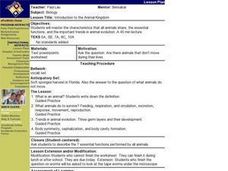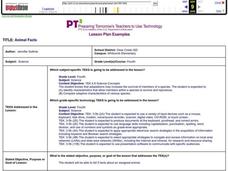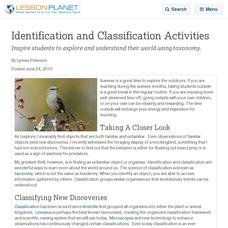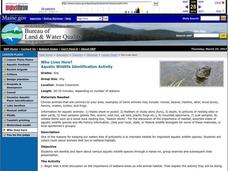Biology Junction
Amphibians
Biologists know of more than 2,300 living species of amphibians. Learn more about the four orders of amphibians with an interesting presentation. It explains the similarities and differences between the thousands of species of...
Curated OER
Types of Animals
Learning about animals, and their classifications, is a regular part of the elementary-school curriculum. Using this presentation, learners can review information relating to animal classification, and test their knowledge. This would be...
Curated OER
Who Am I?
This worksheet allows learners to see animals and reptiles, and also clearly identify them. There are bats, rats, and more. Here you will find 16 clear and colorful pictures which children must match up with their animal names. This...
Curated OER
The Animal Kingdom of Vertebrates
Seventh graders classify fish according to their characteristics. In this classification lesson students learn how to group animals including birds, reptiles and amphibians.
Curated OER
Introduction to the Animal Kingdom
Students are asked: Are there animals that don't move during their lives. They are asked what is an animal? Students discuss what animals need to survive. They are taught the trends in animal evolution. Students discuss the three...
Curated OER
Sharks Taxonomy
Pupils, in groups, establish a classification system for the world of your classroom. They draw a chart to explain their categories and system to the rest of the class.
Curated OER
Kingdom Animalia ~ A Look at the Five Major Classes
Biological taxonomy masters examine the five main classes under phylum chordata. Pupils compare and contrast the identifying characteristics of the various organisms. They explain why taxonomy is important in classifying organisms. You...
Curated OER
Animal Facts
Fourth graders list five facts about an assigned animal, and complete a bird beak activity, using pliers, blunt pencils, forceps, clothespins, and a spoon that represent different types of beaks; students complete chart showing best type...
Curated OER
Biology In Elementary Schools
Students classify animals into six major animal groups and describe the characteristics of the animals found within each group. In this living and non-living animals lesson, students observe a variety of animals, both living and...
Curated OER
Identification and Classification Activities
Explore and understand your world with taxonomy.
Curated OER
Sibling Relationships in the Animal World
Young scholars research sibling relationships in the animal world. In this animal science lesson plan, students read the book, Sisters and Brothers: Sibling Relationships in the Animal World and discuss the sibling relationships. Young...
Curated OER
Animal Alphabet
Second graders identify animals with each letter of the alphabet. In groups, they create a PowerPoint presentation which shows the information they have collected about each one. Using all of this information, they create an animal...
Curated OER
Invertebrate Chordates
Most chordates are easy to identify because of the specific classification criteria of their phylum. But what about tunicates? Young scientists read a short explanation about why tunicates, or sea squirts, are considered to be members of...
Curated OER
Giants of the Animal Kingdom
Fourth graders examine the megafauna found in Australia. They create a food web using cut-outs and develop a timeline to show changes in the fauna over time. They draw their own megafauna scene for their classroom.
Curated OER
Fly Detective
Learners use classification skills and clues to determine which flying insect is the one they need to circle. They read four clues and examine each of the five insects depicted. They then deduce which one is the mystery insect. Answers...
Curated OER
From Curiosity Cabinet to Museum Collection
Learners study binomial nomenclature and museum-based research. They create a curiosity box, label the objects in their curiosity box , develop a classification scheme for the objects, and create a database of all objects collected by...
Curated OER
Who Lives Here?
Young scholars identify various aquatic wildlife species. In this biology lesson students collect clues about animals that live in wetland habitats. Young scholars rotate through several stations displaying particular animal species to...
Curated OER
Wild Horses of the Outer Banks
Students explore animal habitats. In this cross curriculum animal survival and writing lesson, students view a website about wild horses on Shackelford Island and discuss ways in which the horses have changed to this environment. ...
American Museum of Natural History
What's This? Breathing
Crazy fact: Some animals can survive months without oxygen. An online resource describes some unique ways animals collect oxygen and even live without it for an extended time. Learners read about these special animals and use pop-up...
Curated OER
Classified Information - Part 1: Shapes
Third graders investigate how and why scientists use classification. They discuss classification strategies using animals, and as a class fill in a flowchart with their responses. Next, in small groups they cut out a variety of shapes...
Curated OER
Tic Tac Know Kingdoms
In this PowerPoint, students participate in a variation of tic tac toe in which questions about the animal and plant kingdom are presented and students move to various locations on the game board.
Curated OER
What is an Animal?
In this animal classification worksheet, students will review the characteristics used in classifying animals including the development of animals. Students will compare the endoderm, ectoderm, and mesoderm. This worksheet has 4 short...
Curated OER
Classifying Animals
Second graders identify different types of animals on a two charts titled "Mammals" and "Not Mammals." They listen as the book, "They Call Me Wooly," by Keith DuQuette is read to them. Students are asked what is different about the...
Curated OER
Animals and Engineering
Students study animal classification and their interactions. In this animals and engineering instructional activity students study animal communities and how engineers use this knowledge to create new technologies.

























